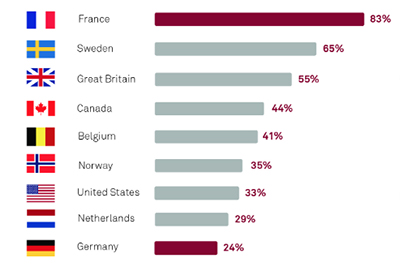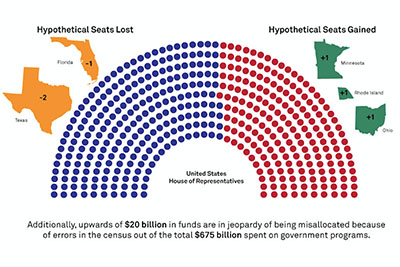Producing Evidence for Better Policy Decisions
IPR’s top-read articles of 2019 highlight interdisciplinary policy research
Get all our news
In Washington and other policymaking hubs, policymakers are hungry for facts and data, but these are often in short supply. ... Interdisciplinary policy research, like the kind IPR conducts, is one antidote: It is not only innovative, but also apolitical, rigorous, and relevant.”
Diane Whitmore Schanzenbach
IPR Director and Economist

In 2019, IPR’s most-read articles reflected a year of celebration, as IPR marked its 50th anniversary, and of commitment, as studies tackled many of the persistent problems that society has faced since IPR’s founding in 1968. The topics revealed how racism and discrimination, immigration challenges, and gender inequality are still present. But they also showed interesting paths forward to resolving persistent ills, such as an hour-long growth mindset intervention that improves academic achievement for all students, including those most disadvantaged.
As IPR Director Diane Whitmore Schanzenbach recently wrote, “In Washington and other policymaking hubs, policymakers are hungry for facts and data, but these are often in short supply. When decisions are made in their absence, bad policy almost always results. Interdisciplinary policy research, like the kind IPR conducts, is one antidote: It is not only innovative, but also apolitical, rigorous, and relevant.”
Read more about how in 2019, IPR researchers have boosted the supply of evidence for better policies below.
Top IPR Research Articles in 2019

Do Some Countries Discriminate
|

IPR@50 Conference Looks Ahead
|

Subtle Racial and Political Discrimination
|

Policy Brief: Accuracy Versus Cost
|

‘Growth Mindset’ Intervention of Less Than an Hour Raises Grades for Ninth GradersA groundbreaking study co-authored by IPR statistician Elizabeth Tipton has revealed how a low-cost, online program taking less than an hour to complete can help students develop a growth mindset and improve their academic achievement. Published in Nature, the study of more than 12,000 ninth-grade U.S. students shows that both lower- and higher-achieving students benefited from the mindset program. Tipton helped design the study’s methodology, making it the first in education or social psychology to employ a random, nationally representative sample of schools. |

Undergraduates Blog About Their Summer Research ExperiencesEach summer since 1998, IPR has run the Summer Undergraduate Research Assistants (SURA) program, which gives undergraduate students first-hand experience in the conceptualization and conduct of policy-relevant social science research. In blog posts, SURA students shared perspectives from, and insights into, their research that covered a variety of projects, including learning how to code the constitutions of Tribal Nations, understanding chronic stress, studying healthcare’s impact, and examining race and gender bias in preschoolers. |

The Impact of Immigration
|

Women Now Seen as Competent as Men, But Still Less Ambitious and DecisiveA meta-analysis co-authored by IPR psychologist Alice Eagly investigated how gender stereotypes in the U.S. have evolved between 1946 and 2018. The study, published in the American Psychologist, analyzed 16 nationally representative U.S. opinion polls conducted with more than 30,000 adult respondents. While people stereotyped women as being just as competent as men by 2018, women were still stereotyped as less ambitious and decisive than men despite their increased participation in the labor force and education. |

‘Starving the Beast’ Traces
|

U.S. Children Show Evidence of Bias
|
IPR faculty also added 31 working papers to the Institute’s series over the year. One of the most downloaded was economist Hannes Schwandt’s working paper about the health consequences of diesel cars that cheated on emissions testing. Other top downloaded working papers examined school spending and college sports.
Additionally, IPR’s most-accessed articles highlighted key events and awards over the year, such as Jocelyn Samuels’ distinguished lecture on LGBT rights and opportunities, Diane Whitmore Schanzenbach’s nomination to the National Academy of Education, and Mesmin Destin’s Distinguished Scientific Award for Early Career Contribution to Psychology from the American Psychological Association. Faculty spotlights on statistician Beth Tipton, linguist Annette D’Onofrio, and psychologist Sylvia Perry, describing their individual paths to conducting the research they do, also resonated with readers.
Read more about these and other articles on IPR’s website.
Photo credits:
Top image: Clockwise from the top left: James Druckman discusses his research at the IPR@50 Conference (R. Hart); Jocelyn Samuels lectured on the challenges and opportunities for LGBT rights (E. Moloney); Statue of Liberty (Flickr/Aku S. Photography); Sylvia Perry (courtesy of Sylvia Perry); IPR Infographic (M. Francis); Stock photo of children playing; Stock photo of traffic; Elizabeth Tipton (S. Schumacher).
Additional images for articles by rows from left to right: IPR Infographic (M. Francis); Christopher Kuzawa (R. Hart); Pexel stock photo of empty classroom; IPR Infographic (C. Gall); iStock photo of students in class; Kaitlyn Rubinstein (C. Gall); Statue of Liberty (Flickr/ Aku S. Photography); Stock photo of women by blackboard; Monica Prasad (P. Reese); Stock photo of children playing.
Published: January 21, 2020.


